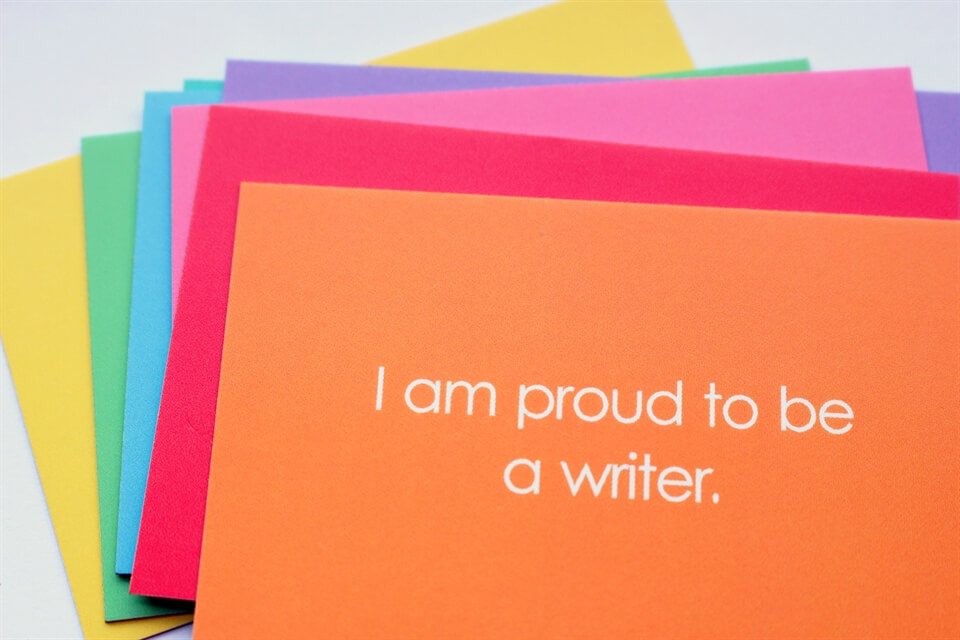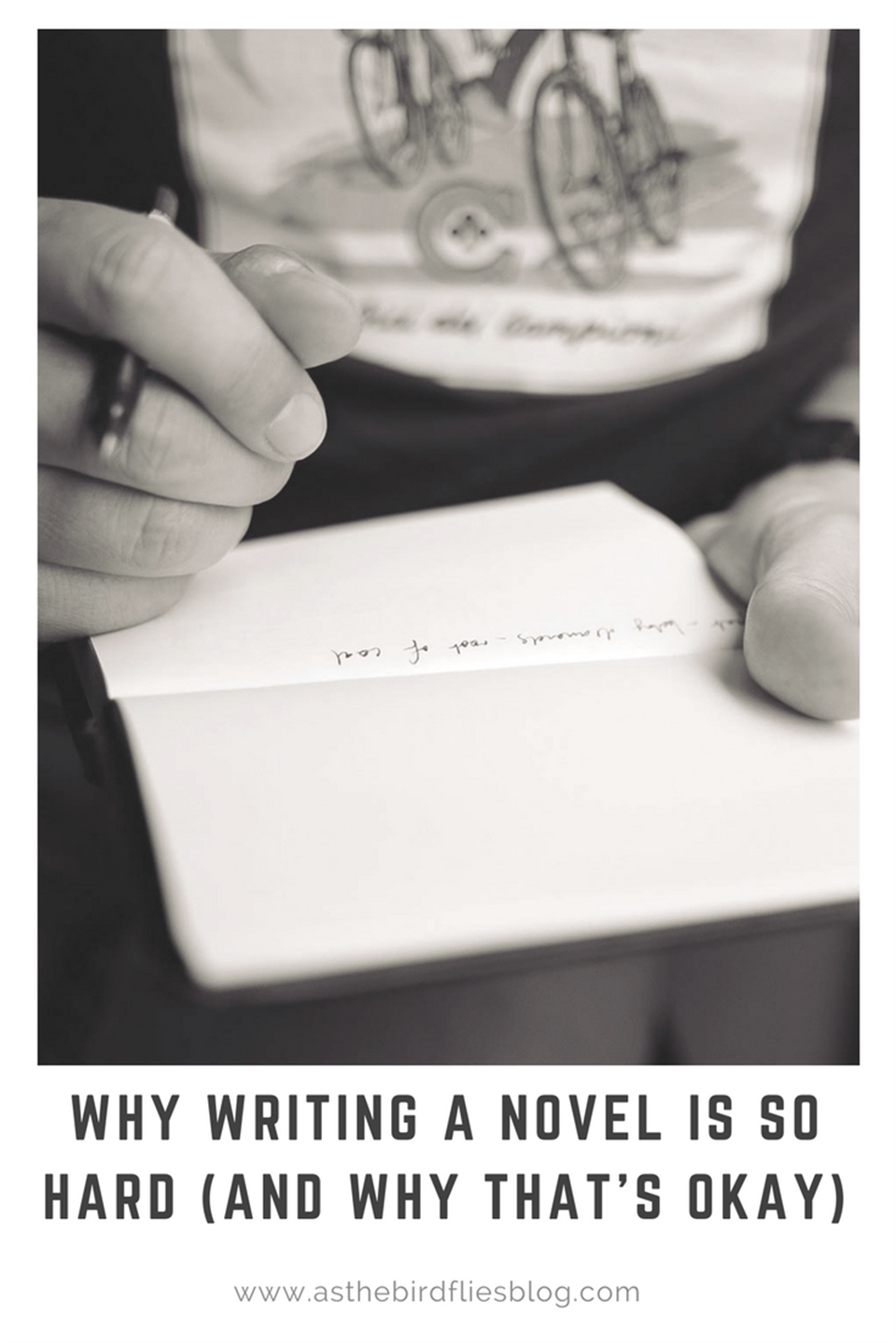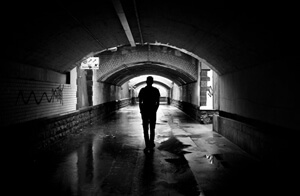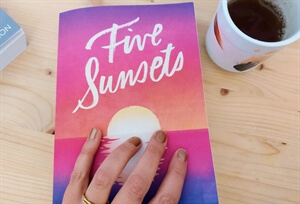On Writing: Why I Haven't Written a Novel Yet

Recently I've been sharing a lot of older posts I've written about NaNoWriMo (over on Twitter and Facebook, as well as on my WriteNOW Cards accounts) but I've only published a few new articles about NaNoWriMo as I approach my sixth year (in a row) of taking on the challenge (see this one about doing NaNoWriMo as a parent, and also this post about what it means to be a NaNoRebel). I've also been re-sharing the many posts I've written about writing tips, like how to write quickly, how to build a writing habit and the apps and tools I use to keep writing fiction regularly. What I haven't really shared is an update on what I'm writing, or rather, what I'm not writing. Because there's something I'm not writing which some of my readers have asked for... a novel.
No novel, no cry?
Last year, I sat down to write the first draft of a novel that I was so certain would be the first novel I would publish and at the time I was very optimistic that the novel would be published and in the hands of a few readers by the time 2017 was over. My previous track record for getting books finished (i.e. written, re-written (several times), edited, proofread, designed and formatted, then read by beta readers) was around 12-18 months so it wasn't a huge stretch of the imagination.
I'd also made preparations to be ensure this novel got written. You see, I'd already attempted writing a novel a few times before, but this time I approached it differently and I spent over a month plotting and planning and getting ready for the first draft. I brainstormed, mind-mapped, sketched, Pinterested and had a chapter by chapter, scene by scene breakdown. However, here we are close to the end of the year and I have to confess that not only is the novel not finished or published, I didn't even finish the first draft, though I wrote over 50,000 words.
I shouldn't have been that surprised. Over the years I have planned, plotted and sat down to write the first draft of four novels and I only got past the drafting stage with one of them. The other three remain abandoned somewhere around halfway through the first draft invariably because I came "stuck" in a plot hole and/or lost interest. My one "success" story now needs SERIOUS structural editing and I've put off doing that because... well, let's stop there.
There are many different reasons why this novel, and all my many other drafts/ideas for novels haven't been written, and here are the key ones that I want to share because I feel like maybe other writers will feel the same way and this will help you feel like you're not alone. I also hope it helps explain to any readers of my books why I've not yet given you a novel...
Writing novels is hard
I'm the first person to say that writing is hard - whatever format you work on. A friend on Facebook recently compared writing and publishing his first book to childbirth and I was very quick to say that as the mother of one child and four published books, labour and childbirth (even lasting 42 hours and resulting in a 9lb baby) was a walk in the park compared to writing (not to mention publishing) a book. Three of my books are short story collections, and the other is a 20,000 word novella.
And I have to say that writing short stories, compared to the work I have done on my novel - and ultimately the problems I encountered that have stopped me in my tracks - is an absolute breeze.
Of course, I think this is because I'm not dealing with the unknown as finishing each short story collection was a little "easier" than the last, but more than that I just think people don't realise how much planning and plotting and problem-solving goes into creating a "good" novel.
I'm not even talking about making characters and dialogue believeable, or wow-ing your reader with flowery prose, I'm talking about just building a story that WORKS, and doesn't fall apart at the seams when you can't connect some dots (see afore mentioned "success" story).
There are some beautifully simple novels out there where indeed nothing much happens (and believe me when I say I look for one such idea in my heaf every single day) but nearly all novels need to have the classic components of any good story, which is at least one character, faced with a problem/challenge, and their journey and conclusion in facing this. Most novels have several characters with several struggles and they all overlap each other while also possibly teaching the reader a few moral lessons etc. I'm just going to lift my open-palmed hands up in the air - emoji style - and say, I don't know how to do this. At least, not yet!
If you've never tried to re-create the "recipe" of writing a good novel, it's really, really hard. In fact, a recipe is a good analogy because when I work on a novel I feel like I'm trying to re-create some magical secret sauce on repeat and I'm never even close to getting the desired flavour. It's like I have only half the right ingredients and I am clueless about the measurements, how long it needs to cook for and which direction I should stir in. I feel like it's a constant experiment, and while a lot of fun, it's also draining and demoralising. I have nothing but respect for the authors of novels that are made with that secret sauce.
And Mr. George R.R. Martin, I am possibly the only person on the planet who does not blame you for taking your sweet time with the next book. P.S. Your plots are bananas complex - HOW DO YOU DO THAT!?!?
A novel is more of a statement than a short story
Excuse me while I just invite my ego to step in for a second.
I'm really, really, really proud of the work I have published so far. All three of my short story collections have been praised for their "polish" and I ploughed hours and hours of time and a lot of money into getting each short story to be the best version of itself, and for each collection to be a journey in itself. Each book took countless re-writes, several collaborations with editors and proofreaders, and perhaps most scarily of all, inviting beta readers to give their honest feedback. I feel like I can hold my head high and be proud of these books.
Often, short fiction collections offer "something for everyone" so I feel confident (and again, proud) that each of my three short story collections offers value and enjoyment to nearly all kinds of readers. In other words, readers may not LOVE every story, but they will still enjoy the collection.
But a novel - a single story - feels so much more vulnerable and fragile. If a reader doesn't like a main character, that can ruin their experience from the outset. If a reader doesn't feel one scene is genuine that impacts the rest of the story. If a reader doesn't feel the chain of events is plausible then the whole story comes crashing down. Now I know that there are editors and beta readers who will help me with addressing and avoiding these very problems, but unlike short stories IF I get it wrong, there is no other story to capture the reader and delight them again. With a novel, there is much more at stake.
Also, if I fail at writing a novel, what kind of writer does that make me?
Okay, now p*ss off again ego!
The longer the work, the more scope for mistakes
Many novelists claim that short stories are harder to write because you have to keep everything - the plot, the prose, the description - short and succinct. You have to pull the reader in quickly and deliver all the elements of a novel in just a few thousand words. You have to get to the point but give enough for the reader to feel both invested and also satisfied by the end.
Personally, I find short stories so much easier to write. Frankly put, I very rarely have an idea for a story that lends itself to a longer form of fiction (this may be my problem!). I'm more interested and inspired by "situations" than saga-style stories. I like to think about an event or a short series of events, or perhaps even the climax of something, and then think about how that affects people. Or I like to think about a twist or a surprise and then I build a story around it. I love building characters - because I'm a borderline obsessive people-watcher - so I enjoy the challenge of describing someone's personality and appearance in just a few words. I love "showing" not "telling" and love it when I can say something with ten words rather than one hundred. Maybe it's the copywriter in me, but I just love culling words when I edit and making a story better the shorter it is. I don't like to waste readers' time.
The novel ideas I have had and worked on have actually been short story ideas that became too long or out of control when I attempted to write them, or they have grown out of an original short story. (The only complete first draft I have is for the novel-length sequel to An Invisible Girl, from London Eyes, which you can read the beginning of here.) I still think that this will be the only way I will eventually write a novel, because this is how my "writing brain" works; start small and then grow it.
However, I don't know how to stop fearing longer forms of fiction. Not only is there more scope from problems with the plot and prose (I'm forever repeating the same old words) but there's new issues of character consistency and maintaining authentic dialogue, things I can sort of "get away with" as short story writer. Again, I know that editors exist to help with these very issues, but I have to admit that even working with an editor on a novel intimidates me so much more than when I've sent off short stories. Invariably, editors don't need to "get" (i.e. like) a short story to see if it works or not, but with a novel, isn't it sort of essential that they're invested somewhat in the over-arching themes and storyline?
As we all often say, less is sometimes more. And with a novel I feel like more could maybe expose me as a lesser writer...
I have other priorities now
For the best part of four years when I started writing down ideas for Shy Feet until I was lying in a hospital bed pushing out a baby boy, writing was my priority after my partner and work. I was treating books like a business and as I mentioned I was averaging one book a year, and I had a good network of editors, proofreaders, designers and beta readers to make my collections of short stories (and my one novella, The Wait), the best possible books they could be. I was so excited by this journey and had a five-year plan to try and make writing fiction my main source of income.
But then I became a mother and two things happened. Firstly, my priorities instantly changed with my son stealing the top spot with a tirade of pooey nappies and sleepless nights - it wasn't graceful, but it was real and all-consuming. He is and always will be my number one focus both in terms of time and energy. Practically speaking, I spend half my week alone with him and even on days when he's at childcare, I work full-time, so I have very limited flexibility and time to squeeze in the same number of hours writing I used to do (think 2-3 hours a day, whereas now I'm lucky to achieve that in a week).
Secondly, I became unwell. A combination of post-natal depression and anxiety meant I was very slow getting back to work and a productive writing routine, and while I've been writing with some regularlity through it all, none of it was in line with my business and production goals. I actually went back to writing for pleasure, because I needed to, and in many ways that has remained more important to me from a mental health perspective. Financially, I also had to prioritise the freelance work I do because it pays (A LOT!) better, is more reliable and is going to keep my son in many more nappies than the pennies I earn from selling my books.
I don't regret writing more for pleasure than business because it has led to me creating WriteNOW Cards, affirmation cards designed to help writers achieve their goals, and I hope I will always write primarily because I love it, but I do know that one day I want to return to a more demanding and productive writing schedule, I just don't think (for the same health reasons!) it will be while my son (and possible other future children) are young. One day they won't need or want to be around their mother all day every day, and that is when I will return my focus to my writing goals, and maybe getting this novel that's inside me written!
I am still learning my craft...
This is the most important and significant reason I haven't written a novel yet. It's also the hardest to admit. I haven't written a novel yet because I'm not ready. I still have a lot to learn. I feel like I haven't read enough books yet - both books on the craft and novels that I can gain things from. I want to lose myself in other authors' work and understand what it is that I love so much so I can, frankly, copy or adapt this. I'm simply not educated, informed, competent enough to create the work I want to. This is hard to admit when you've been putting your work out into the world for the last five years, and when you try to inspired other people to do the same. I feel hypocritical holding my hands up and saying "I'm just not that good at writing yet" when I spend so long preaching about writing be it with writing advice posts on this blog or as the creator of WriteNOW Cards..
But there's also a part of me that exhaled once I accepted that I've still got more to learn before I write my novel, and she's been persitent in reminding that there is no shame in being a student. There is no shame in wanting to learn more. There is no shame in recognising you don't have enough experience or skills to achieve what you want to. The important thing is to keep working on it, no matter how slowly.
I have many ideas and theories about what will work but ultimately I know that I'm just going to have to keep diving into longer form fiction, be it returning to those drafts or starting a new one. I'm also hoping writing novellas will perhaps bridge the knowledge gap, or help me to do so. Writing The Wait was such an educational experience as it has a fast-paced and complicated plot with a lot of twists and turns along the way. It's a mystery-thriller so not my usual style of fiction, but I learned so much from stepping outside of my comfort zone and playing around with more words than usual. I'm very close to finishing the sequel to this story and it will very likely be around 30,000 words so I suspect I will keep building on this format in order to keep learning more about writing longer form fiction.
With NaNoWriMo just a few days away I wish I could say that I'll be drafting a new novel but I just don't know what the right thing to do is (if you have suggestions - please leave a comment!) but one thing's for sure, I know I'll be writing something... because it's through writing that I learn and it's through learning that I'll hopefully one day write a novel worthy of being read.
The cards featured in the photo in this post are WriteNOW Cards - affirmation cards designed for writers to help you build and enjoy your writing practice - they're available to buy in packs of 10 or 50 here.
And if you'd like to share or save this post, here's an image you can pin:


Frances M. Thompson
Find Frankie on Facebook, Twitter, Instagram, Pinterest, and Google+.
 On Writing: My Writing & Publishing Plans for 2023
On Writing: My Writing & Publishing Plans for 2023 The Weaker Sex: Read the Prologue
The Weaker Sex: Read the Prologue My Thoughts: The Life-Enhancing Joy of Romance Novels
My Thoughts: The Life-Enhancing Joy of Romance Novels All About My Next Book: Five Sunsets
All About My Next Book: Five Sunsets_x300.jpg?v=1) On Writing: The Year I Decided to Write for My Life
On Writing: The Year I Decided to Write for My Life About the Blog & Frankie
About the Blog & Frankie Welcome to My Amsterdam Travel Blog!
Welcome to My Amsterdam Travel Blog! Welcome to My Luxury Family Travel Blog!
Welcome to My Luxury Family Travel Blog! Welcome to My Writing Blog!
Welcome to My Writing Blog! Lover Mother Other: Poems - Out Now!
Lover Mother Other: Poems - Out Now! I Write Stories That Move You
I Write Stories That Move You Order WriteNOW Cards - Affirmation Cards for Writers
Order WriteNOW Cards - Affirmation Cards for Writers Work With Me
Work With Me